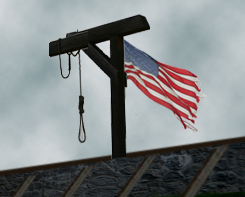Nine men who had been sentenced to death were exonerated and freed in 2009, the second highest number of exonerations since the death penalty was reinstated. The inmates freed this year spent a combined 121 years between their death sentence and exoneration.
Challenges to the three-drug cocktail are still underway in California, Maryland, Kentucky, and in the federal system.
The message from all this:
The principal story of 2009 was the impact of the deep economic crisis facing the country. As states were forced to cut essential services, many leaders concluded the death penalty was a wasteful government program that should be considered for repeal. Eleven states debated bills to abolish the death penalty. New Mexico joined New Jersey and New York as states that recently ended the death penalty. Other states such as Maryland, Colorado, Montana, and Connecticut came close to the same choice this year.
The huge costs of the death penalty were mirrored by its lack of benefits. Death sentences continued to decline, having now dropped over 60% since 328 people were sentenced to death in 1994. The problem of innocence, which has been a catalyst for many of the changes surrounding the death penalty, remained prominent in 2009. Nine new exonerations brought the national total to 139 since 1973.
A poll of police chiefs had this result:
The chiefs put the death penalty last on their list of priorities for a safer society. They and many leading citizens would rather see the millions spent on the death penalty directed to more reliable measures to fight crime. As the economic crisis continues in the year ahead, the death penalty will face heightened scrutiny.
The death penalty is applied in an arbirary and racially unbalanced manner. It's expensive. And we don't have the tools in place to ensure we aren't executing someone who is innocent. Life without parole for those whose guilt is not an issue, and access to DNA and other scientific testing for those who claim innocence are a much wiser use of our limited funds -- and would raise our country's esteem around the world





